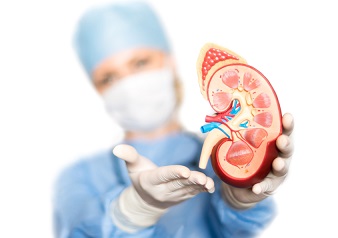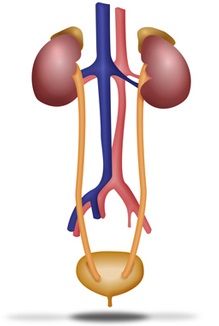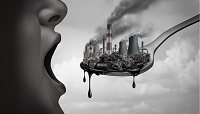
Poor diet, environmental pollution and daily stress factors poison the body. The human body has tools to defend itself against toxins, but in some cases it needs external help for this detoxification process.
To know the importance of kidney detoxification, we must first know how these organs work.
Why are our kidneys important?
The kidneys are vital organs that perform many functions in order to keep the blood clean and chemically balanced. Understanding how your kidneys work helps you know how to keep them healthy.
Each of the kidneys is a pea-shaped organ about the size of a fist. They are located towards the middle of the back, just below the ribs. The kidneys are sophisticated processing machines. Each day they process about 200 liters of blood to eliminate 2 liters of waste products and excess water. The waste and water are converted into urine that flows to the bladder through tubes called ureters. The bladder stores urine until you go to the bathroom.
The waste in the blood comes from the normal wear and tear of tissues and the food you eat. The body uses food to produce energy and to repair itself. Once the body has taken the nutrients it needs, the waste passes into the blood. . If the kidneys did not remove waste, it would accumulate in the blood and harm the body.

Blood filtration takes place in small units within the kidneys called nephrons. Each kidney has about a million nephrons. The nephron is made up of a small blood vessel or capillary, called the glomerulus, intertwined with a small urine collecting duct called the tubule. A complex chemical exchange takes place in the nephron during which waste and water pass from the blood to the urinary system.
The tubules first receive a combination of waste products and chemicals that the body can still use. The kidneys measure the amount of chemicals such as sodium, phosphorus and potassium, and then return a part of these to the blood. In this way, the kidneys regulate the body's concentrations of these substances, since maintaining a precise balance is essential for life, since concentrations that are too high can be harmful.
In addition to removing waste, the kidneys produce three important hormones:
- Erythropoietin or EPO: stimulates the production of red blood cells in the bone marrow.
- Renin: regulates blood pressure.
- The active form of vitamin D, which helps maintain the amount of calcium in the body necessary for bones and to achieve a normal chemical balance. 1
What are toxins?
A toxin is any agent (physical, chemical, macrobiotic, etc.) that negatively modifies or damages a balanced biological system.
Substances harmful to the human body are called homotoxins (derived from the Latin homo = man and the Greek toxon = toxin).
They are classified into:
- Exogenous. Those that come from the environment.
- Endogenous. Those that are formed in the body by physiological or pathological processes.
Exogenous homotoxins. They are those that reach our body from an external environment through the gastrointestinal or respiratory system. Some of them are known (tobacco, alcohol, drugs), others are less known (flavorings, colorings, food sweeteners) or even unknown ( cadmium, glues, gases, radiation, etc.). Polluting agents:
- Polluting gases: carbon monoxide, hydrocarbons, ozone, carbon dioxide.
- Polluting particles: dust, smoke, aerosols, gases, vapors.
- Heavy metals (mercury, lead, etc.).
- Polymerizers: present in hard plastics such as PVC, in oily substances in perfumes, in hair sprays, in lubricants, in paint and wood.
- Drugs
- Additives and preservatives: These are what are added to food to change its smell or color, some of them are carcinogenic and mutagenic.
- Toxic materials in the home (glues, paints, stain removers, cleaning and disinfection products, etc.).

Endogenous homotoxins. For the most part, they are intermediate products or residues of metabolic processes, of which accumulation or overproduction occurs, and they have not been adequately metabolized and excreted.
- CO2, lactic acid, urea, calcium oxalate, ammonia.
- Other endogenous homotoxins are the result of an imbalance in hormonal secretion (for example, alteration in the balance of estrogen and testosterone, etc.). 2
Why is detox important?
Detoxification is important because the body needs to eliminate toxins that in most cases alter the functional balance of the individual and their state of health. Many of these toxins accumulate for years in our body, causing a series of diseases.
Our body has a sophisticated detoxification system to neutralize and excrete toxins, but when there is an overload of toxic substances, the detoxification organs cannot ensure their adequate biotransformation.
The body has organs and systems that we must take care of, since they are responsible for cleaning, impurities and organic waste, these are the liver, kidneys, skin and lungs. 3
As we already know how important our kidneys are, we must take care of them either with our diet or by being careful not to expose ourselves to toxic agents, but there are times when more help is needed with special treatments to detoxify the kidneys.
PRONAPRESA
"Because prevention is better than cure"





















































